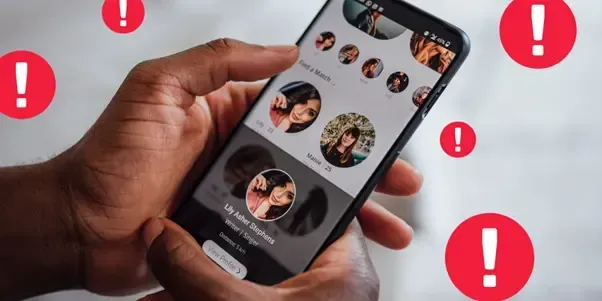You are what you click!
Learn how to make cybersecurity your way of life in an easy and guided way.
You are what you click!
Become Cyber savvy
EXPLORE BLOG BELOW
You are what you click!
Become Cyber savvy
You are what you click!
Become Cyber savvy
You are what you click!
Become Cyber savvy

7 Tips to Avoid Online Romance Scams
How to Avoid Romance and Love Scams Online
How to Avoid Romance and Love Scams Online is the most asked question in today’s life. Romance and love scams are becoming increasingly common online. With victims losing millions of dollars each year to con artists posing as potential partners. These scams often prey on people who are looking for love and can be particularly devastating due to the emotional toll they take. However, by being aware of common red flags. And taking proactive steps to protect yourself, it is possible to avoid falling victim to these types of scams. In this article, we will explore the tactics used by scammers. Provide tips for staying safe, and discuss what to do if you believe you have been scammed.
I believe that love is the most amazing gift we can possess! Do you agree?
There are many scientific reasons that explain the proof that the chemistry of love can impact our physical, mental and spiritual well being in a positive way. Many people explain that feeling of butterflies in your stomach, or maybe a tingly sensation when you try to speak, when you are around someone you feel a connection to. It can be exciting!
I can still remember the first time I liked a boy. His name was Julius and many decades later I can recall that feeling, not necessarily the details, but how that love made me feel. Love has been a fundamental piece in my life. As the years have gone by, I have become more devoted to cultivating self-love, in addition to the love I have for my husband, my family, my friends and my passions.

Tactics used by scammers
Romance and love scams are very popular. There are two main profiles that the scammer will use to try and trick you. SInce Valentine’s day is right around the corner, let’s prepare to celebrate love and protect our online well being.
Love Scam Personality 1: The Faker
This person likes to connect through love portals: social media, dating websites, email, and possibly other forms of communication like phone or text. The faker will slowly develop a relationship and a level of connection with their victim. They spend a lot of time researching what you like or dislike, what kind of information already exists about you online, and creates a persona based on what could attract and lure you in. This scammer creates a profile of you in their mind based on all the information that is available about you. Once the online romance becomes stronger and they have gained more of your trust, they will start sharing their struggles, family emergencies, sudden accidents, or other stories with the intention of asking you to provide financial support.
5 red flags for this type of “romance”:
If you are using a dating service, they ask to communicate outside via email or messaging. Most dating services monitor their services and could spot a scammer, so asking to talk outside of this website could be a way to escape detection.
They make frequent promises to meet you in person but always cancel, or something happens at the last minute, so they can’t meet you.
They come up with excuses for not sharing or showing more pictures of themselves, or avoid video-chatting or even voice calls. This could be to avoid revealing their true identity.
Their messages are vague and generic, they try to stay away from providing details about themselves and focus on gathering more information about you; which could be a trap if we are craving for attention and someone to listen to us.
They indirectly or even directly ask for money or make financial transactions on their behalf, using your name instead of theirs.
Love Scam Personality 2: The Impersonator
The impersonator steals the identity and social media profile of real people. They will use their pictures, friends, and imitate/duplicate their online activity. When they pose as a particular person that exists online, they can gain your trust when you investigate them, because they seem “legit”.
5 red flags for this type of “romance”:
Their profile doesn’t match what their conversations with you. Their tone or the way they communicate is peculiar, or perhaps the details they give you are different from their public information.
Their story is inconsistent – they could send you an email or message with the wrong name, which means they could be scamming multiple people simultaneously.
It seems “too good to be true.” Even though they are already using a stolen profile, they will add glamorous pictures to highlight them as an attractive individual. Look out for photos that show them as a wealthy person or luxurious items/trips.
The relationship progresses extremely quickly. They profess their love for you, and may even call you the love of their life in a very short period of time. Keep in mind that there are still some impersonators that will work to gain your confidence over time, so they could develop the relationship slowly.
They indirectly ask for money, gift cards or financial support for a family member or friend. Or they may claim a sudden accident, sickness, etc. has befallen them and they need your help.
It is hard because we want love, and as one of the most beautiful gifts, who wouldn’t want it? I have heard of many successful relationships that started online. I even have friends who are now happily married and enjoying an amazing life, all because they met through the digital world. There are certainly many real connections that are formed online, so don’t give up hope because scammers, hackers and Cybermonsters may try to deceive you. There are many things you can do if you are looking for love and want to keep you and your family safe.

Here are 7 ways you can be safe in your cyber love adventures:
Trust but verify. Check their story, who they say they are, and their social media profiles. Online searches are very useful, you could even check if their photos are real using the image search option.
Take it slow. Don’t share intimate details, financial details or photos of yourself that could be used to blackmail you or extort you.
Use legit dating websites. Once you start talking to someone on a dating website, keep your communications on that service until you meet in person and can validate that they are a real person.
Be suspicious. If you are asked to send money directly or indirectly, or if suddenly the person you are dating wants to meet in person, don’t assume they are innocent. Put your own safety first.
Ask a friend. Share information about your conversations with this person with someone you trust. Use them as your sounding board, and keep the old saying “love is blind” in mind. Be open to their feedback, especially if they spot something suspicious
Listen to your instincts. When you think something is too good to be true, let your inner voice guide you. Most of the time you will be right!
Be Mindful. Know what information that is available about you online. Remove details that shouldn’t be public like your date of birth, address, etc.
People also ask
1. What is a romance scam?
A romance scam is a type of online fraud where a person is tricked into believing they are in a romantic relationship with someone who is actually a scammer. The scammer then asks for money or personal information.
2. How do romance scams work ?
Romance scams work by tricking victims into thinking they have a romantic relationship with a scammer who is pretending to be someone else. The scammer gains the victim’s trust and then asks for money, often for a fake emergency. The scammer takes the money and disappears, leaving the victim feeling foolish and heartbroken.
3. How to spot a romance scam ?
To spot a romance scam, look out for the following signs:
Request for money: If the person you are communicating with starts asking for money, this may be a red flag of a romance scam.
Too good to be true: Be cautious if the person you are communicating with seems too good to be true, such as having a perfect profile and life.
Pressure to move the conversation off the dating platform: Scammers often try to get their victims to communicate off the dating site or app so they can have more control.
Lack of personal information: If the person you are communicating with is vague or unwilling to share personal information, this may be a sign of a scam.
Inconsistent stories: Watch out for inconsistencies in the story or background of the person you are communicating with.
Poor grammar or spelling: Many scammers are not native English speakers and may have poor grammar or spelling in their messages.
Requests for private photos: Scammers may try to get their victims to send private photos, which they can then use for blackmail or other purposes.
Fake profiles: Be cautious of profiles with fake or outdated photos and information.
Lack of face-to-face interaction: If the person you are communicating with never wants to video chat or meet in person, this may be a sign of a scam.
4. Is romance scamming illegal?
Yes, romance scamming is illegal and is considered a form of fraud. It is a crime that involves tricking someone into sending money or giving personal information by pretending to have romantic feelings for the victim. Perpetrators of romance scams can face criminal charges and penalties, including imprisonment and fines, depending on the jurisdiction and severity of the offense.
5. Where to Report romance scams?
To report a romance scam, you can reach out to the following organizations:
Federal Trade Commission (FTC) in the US
The Australian Competition and Consumer Commission (ACCC) in Australia
The Action Fraud UK in the UK
Your local police department
Your bank or financial institution if you have been a victim of financial fraud.
It is also recommended to inform your social media platform or online dating service if you have been a victim of a romance scam on their platform.
6. What to do? If you suspect an online relationship is a scam
If you suspect an online relationship is a scam, you should:
Cease all communication with the suspected scammer.
Report the scam to the relevant authorities such as the police and online platform where the scam took place.
Do not send any more money to the scammer.
Gather and keep any evidence of the scam, including emails and messages.
Contact your bank and inform them if you have sent any money to the scammer.
Seek support from friends and family or consider seeking professional support to help cope with the emotional impact of the scam.
With these tips in mind, you can find a connection, and maybe even love online.
Have you heard any success or horror stories about finding love online? I can’t wait to hear all about them!
You May also like to Read: 5 Secrets to Protect Your Passwords
Whitelist vs. Blacklist: Crucial Differences & Significance
How Can You Protect Yourself On Social Networking Sites
Malware vs Ransomware – Discover The Differences and How To Protect Yourself

Sandra Estok
Subscribe for more ways to protect what matters most to you against hackers, scammers, and Cybermonsters™
Latest blog posts:

7 Tips to Avoid Online Romance Scams
How to Avoid Romance and Love Scams Online
How to Avoid Romance and Love Scams Online is the most asked question in today’s life. Romance and love scams are becoming increasingly common online. With victims losing millions of dollars each year to con artists posing as potential partners. These scams often prey on people who are looking for love and can be particularly devastating due to the emotional toll they take. However, by being aware of common red flags. And taking proactive steps to protect yourself, it is possible to avoid falling victim to these types of scams. In this article, we will explore the tactics used by scammers. Provide tips for staying safe, and discuss what to do if you believe you have been scammed.
I believe that love is the most amazing gift we can possess! Do you agree?
There are many scientific reasons that explain the proof that the chemistry of love can impact our physical, mental and spiritual well being in a positive way. Many people explain that feeling of butterflies in your stomach, or maybe a tingly sensation when you try to speak, when you are around someone you feel a connection to. It can be exciting!
I can still remember the first time I liked a boy. His name was Julius and many decades later I can recall that feeling, not necessarily the details, but how that love made me feel. Love has been a fundamental piece in my life. As the years have gone by, I have become more devoted to cultivating self-love, in addition to the love I have for my husband, my family, my friends and my passions.

Tactics used by scammers
Romance and love scams are very popular. There are two main profiles that the scammer will use to try and trick you. SInce Valentine’s day is right around the corner, let’s prepare to celebrate love and protect our online well being.
Love Scam Personality 1: The Faker
This person likes to connect through love portals: social media, dating websites, email, and possibly other forms of communication like phone or text. The faker will slowly develop a relationship and a level of connection with their victim. They spend a lot of time researching what you like or dislike, what kind of information already exists about you online, and creates a persona based on what could attract and lure you in. This scammer creates a profile of you in their mind based on all the information that is available about you. Once the online romance becomes stronger and they have gained more of your trust, they will start sharing their struggles, family emergencies, sudden accidents, or other stories with the intention of asking you to provide financial support.
5 red flags for this type of “romance”:
If you are using a dating service, they ask to communicate outside via email or messaging. Most dating services monitor their services and could spot a scammer, so asking to talk outside of this website could be a way to escape detection.
They make frequent promises to meet you in person but always cancel, or something happens at the last minute, so they can’t meet you.
They come up with excuses for not sharing or showing more pictures of themselves, or avoid video-chatting or even voice calls. This could be to avoid revealing their true identity.
Their messages are vague and generic, they try to stay away from providing details about themselves and focus on gathering more information about you; which could be a trap if we are craving for attention and someone to listen to us.
They indirectly or even directly ask for money or make financial transactions on their behalf, using your name instead of theirs.
Love Scam Personality 2: The Impersonator
The impersonator steals the identity and social media profile of real people. They will use their pictures, friends, and imitate/duplicate their online activity. When they pose as a particular person that exists online, they can gain your trust when you investigate them, because they seem “legit”.
5 red flags for this type of “romance”:
Their profile doesn’t match what their conversations with you. Their tone or the way they communicate is peculiar, or perhaps the details they give you are different from their public information.
Their story is inconsistent – they could send you an email or message with the wrong name, which means they could be scamming multiple people simultaneously.
It seems “too good to be true.” Even though they are already using a stolen profile, they will add glamorous pictures to highlight them as an attractive individual. Look out for photos that show them as a wealthy person or luxurious items/trips.
The relationship progresses extremely quickly. They profess their love for you, and may even call you the love of their life in a very short period of time. Keep in mind that there are still some impersonators that will work to gain your confidence over time, so they could develop the relationship slowly.
They indirectly ask for money, gift cards or financial support for a family member or friend. Or they may claim a sudden accident, sickness, etc. has befallen them and they need your help.
It is hard because we want love, and as one of the most beautiful gifts, who wouldn’t want it? I have heard of many successful relationships that started online. I even have friends who are now happily married and enjoying an amazing life, all because they met through the digital world. There are certainly many real connections that are formed online, so don’t give up hope because scammers, hackers and Cybermonsters may try to deceive you. There are many things you can do if you are looking for love and want to keep you and your family safe.

Here are 7 ways you can be safe in your cyber love adventures:
Trust but verify. Check their story, who they say they are, and their social media profiles. Online searches are very useful, you could even check if their photos are real using the image search option.
Take it slow. Don’t share intimate details, financial details or photos of yourself that could be used to blackmail you or extort you.
Use legit dating websites. Once you start talking to someone on a dating website, keep your communications on that service until you meet in person and can validate that they are a real person.
Be suspicious. If you are asked to send money directly or indirectly, or if suddenly the person you are dating wants to meet in person, don’t assume they are innocent. Put your own safety first.
Ask a friend. Share information about your conversations with this person with someone you trust. Use them as your sounding board, and keep the old saying “love is blind” in mind. Be open to their feedback, especially if they spot something suspicious
Listen to your instincts. When you think something is too good to be true, let your inner voice guide you. Most of the time you will be right!
Be Mindful. Know what information that is available about you online. Remove details that shouldn’t be public like your date of birth, address, etc.
People also ask
1. What is a romance scam?
A romance scam is a type of online fraud where a person is tricked into believing they are in a romantic relationship with someone who is actually a scammer. The scammer then asks for money or personal information.
2. How do romance scams work ?
Romance scams work by tricking victims into thinking they have a romantic relationship with a scammer who is pretending to be someone else. The scammer gains the victim’s trust and then asks for money, often for a fake emergency. The scammer takes the money and disappears, leaving the victim feeling foolish and heartbroken.
3. How to spot a romance scam ?
To spot a romance scam, look out for the following signs:
Request for money: If the person you are communicating with starts asking for money, this may be a red flag of a romance scam.
Too good to be true: Be cautious if the person you are communicating with seems too good to be true, such as having a perfect profile and life.
Pressure to move the conversation off the dating platform: Scammers often try to get their victims to communicate off the dating site or app so they can have more control.
Lack of personal information: If the person you are communicating with is vague or unwilling to share personal information, this may be a sign of a scam.
Inconsistent stories: Watch out for inconsistencies in the story or background of the person you are communicating with.
Poor grammar or spelling: Many scammers are not native English speakers and may have poor grammar or spelling in their messages.
Requests for private photos: Scammers may try to get their victims to send private photos, which they can then use for blackmail or other purposes.
Fake profiles: Be cautious of profiles with fake or outdated photos and information.
Lack of face-to-face interaction: If the person you are communicating with never wants to video chat or meet in person, this may be a sign of a scam.
4. Is romance scamming illegal?
Yes, romance scamming is illegal and is considered a form of fraud. It is a crime that involves tricking someone into sending money or giving personal information by pretending to have romantic feelings for the victim. Perpetrators of romance scams can face criminal charges and penalties, including imprisonment and fines, depending on the jurisdiction and severity of the offense.
5. Where to Report romance scams?
To report a romance scam, you can reach out to the following organizations:
Federal Trade Commission (FTC) in the US
The Australian Competition and Consumer Commission (ACCC) in Australia
The Action Fraud UK in the UK
Your local police department
Your bank or financial institution if you have been a victim of financial fraud.
It is also recommended to inform your social media platform or online dating service if you have been a victim of a romance scam on their platform.
6. What to do? If you suspect an online relationship is a scam
If you suspect an online relationship is a scam, you should:
Cease all communication with the suspected scammer.
Report the scam to the relevant authorities such as the police and online platform where the scam took place.
Do not send any more money to the scammer.
Gather and keep any evidence of the scam, including emails and messages.
Contact your bank and inform them if you have sent any money to the scammer.
Seek support from friends and family or consider seeking professional support to help cope with the emotional impact of the scam.
With these tips in mind, you can find a connection, and maybe even love online.
Have you heard any success or horror stories about finding love online? I can’t wait to hear all about them!
You May also like to Read: 5 Secrets to Protect Your Passwords
Whitelist vs. Blacklist: Crucial Differences & Significance
How Can You Protect Yourself On Social Networking Sites
Malware vs Ransomware – Discover The Differences and How To Protect Yourself

Sandra Estok
Subscribe for more ways to protect what matters most to you against hackers, scammers, and Cybermonsters™
Stop Hackers, Scammers and Cybermonsters in their tracks.
Take charge of your Cyber Life today!
Push Cybermonsters away from your private data.
Subscribe to my newsletter about cybersecurity and cyber safety. New issues every Tuesday.




